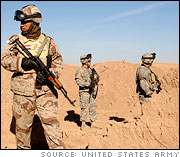2010 Year in Review - Iraq

Major World News Stories of 2010
Few Signs of Progress Lead to Protracted U.S. Involvement in Afghanistan | Greece and Ireland Battered by Financial Crisis | The Ground Shakes in Haiti | Undaunted by Sanctions, Iran Continues to Pursue Nuclear Program | Peace Remains Elusive for Israelis and Palestinians | North Korea Provokes South with Brinkmanship | Anti-Government Protests Continue and Turn Deadly in Thailand | Release of Secret Military, Government, and Diplomatic Documents Sparks Outrage and Controversy IraqIraq Struggles to Form a Government After ElectionsPresident Barack Obama announced in 2009 that he planned to withdraw combat troops from Iraq by the end of August 2010. However, the withdrawal of troops was largely contingent upon successful parliamentary elections in March 2010. The lead up to the elections was fraught with sectarian tension that threatened to derail the electoral process. Sectarian violence increased in the days leading up to the March 7 election, but the tension was less deadly than widely feared. On election day itself, dozens of bombs exploded in Baghdad. Most were non-lethal, but two killed at least 38 people. Iraq's election commission reported that 62% of Iraqis voted in the election, a lower turnout than in the last parliamentary election, held in 2005. Turnout was around 50% in Baghdad, where the violence was most prominent. Election Results Prove InconclusiveFinal results, released in late March, gave the Iraqi National Movement, led by former prime minister Ayad Allawi, 91 seats in Parliament out of 325. Allawi gained traction in the weeks leading up to the election. A secular, nationalist Shiite, Allawi received support from Sunni Muslims, and he fared particularly well in Sunni-dominated central and western Iraq. The State of Law alliance, headed by Prime Minister Maliki came in a close second with 89 seats. Both fell far short of the 163 seats needed to form a majority in Parliament. A Shia religious movement, including followers of radical cleric Moktada al-Sadr, won 70. The two main Kurdish parties together received 43 seats. Maliki challenged the results, and a recount of votes in the Baghdad region confirmed Allawi's slim lead. In October, Maliki formed an alliance with the Shiite bloc led by al-Sadr, his former rival, which put him close to a majority of seats. Negotiations continued, and American officials strongly urged the Sunnis, many of whom backed Allawi, to remain in the negotiations to be assured a role in the government. An agreement to form a unity government was finally reached in November that allowed Maliki to retain his position as prime minister and the Kurds held on to the presidency. Allawi's coalition, Iraqiya, was promised the role of speaker of the Parliament and leadership of a new committee charged with overseeing security. U.S. Achieves Another Milestone in IraqOn August 31, more than seven years after the war in Iraq began, U.S. president Barack Obama announced the end of U.S. combat operations in Iraq. Obama emphasized that U.S. domestic problems, mainly the flailing economy and widespread unemployment, are more pressing matters to his country. The U.S. will continue to be a presence in Iraq, mainly with civilian contractors but also with a smaller military contingent of approximately 50,000 troops. The remaining troops are scheduled to leave Iraq by the end of 2011. For more information on the state of Iraq in 2010: |
- More from 2010 News of the World









